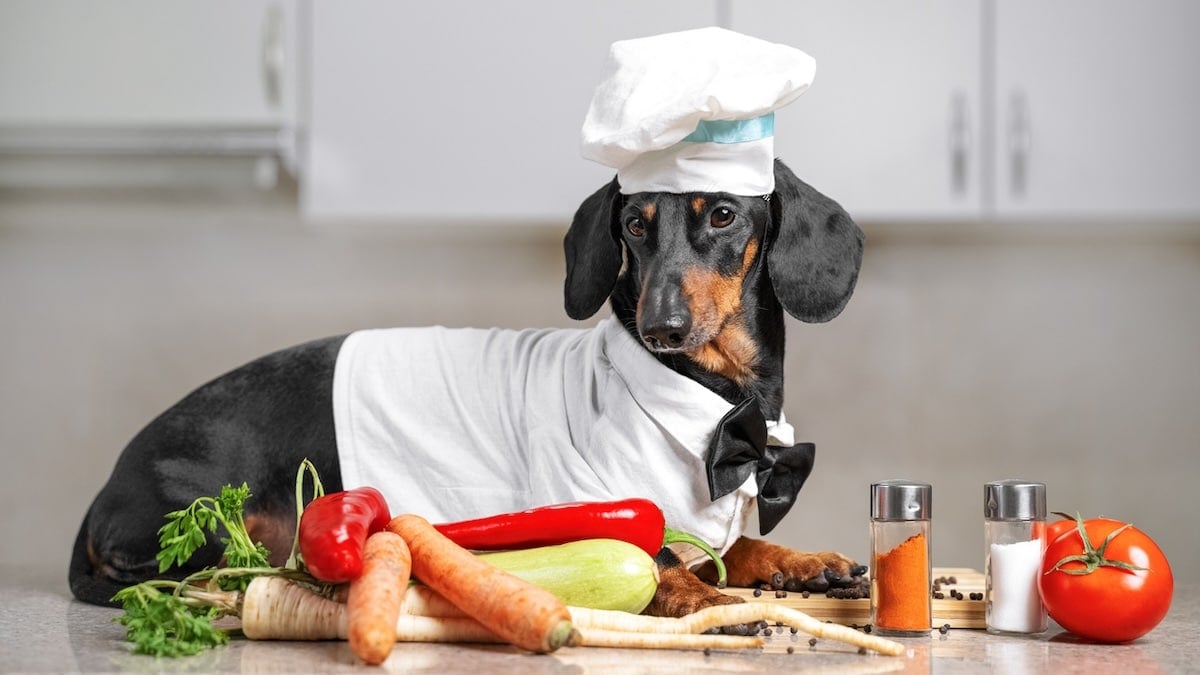
This post contains affiliate links. Read more here.Not a substitute for professional veterinary help.
From protein-packed lean meat to nutrient-rich fruits and vegetables, some human foods aren’t just safe for dogs—they’re good for them, too. Human food can be a nutritious dietary supplement for dogs, and some foods are healthier than others.
Whether you’re looking for a safe alternative to commercial training treats or want to give your dog’s diet a nutritional boost, we’re here to help. In this guide, we’ll cover the dog-safe human foods worth including in your pup’s diet (and how to do it).
What Kinds of Human Foods Are Good for Dogs?
Few dogs will turn up their noses at the chance to sneak scraps from your dinner plate. As an occasional treat, many human foods are safe for dogs. But are any actually good for them?
When it comes to healthy human food for dogs, these are at the top of our list:
Let’s take a closer look at some of the healthy human foods on this list to discover what makes them good for dogs.
Blueberries
Rich in antioxidants and essential nutrients like vitamin C and vitamin K, blueberries are a healthy snack for dogs. They’re also bite-sized, so they work well as training treats. Like any fiber-rich food, however, blueberries can upset your dog’s digestion if they’re not used to them. So, it’s best to offer a few blueberries at a time to see how your dog handles them.
Chicken
Like turkey, chicken is a great source of lean protein for dogs. It’s safe to offer your dog boneless, skinless chicken as long as it’s fully cooked and unseasoned. If you’re looking for a high-value training treat or low-calorie meal mixer or topper, pieces of cooked chicken breast might do the trick.
While many dogs tolerate chicken well, it’s one of several common food allergens. Keep an eye out for signs of an allergic reaction if your dog hasn’t eaten it before.
Cottage cheese
Some dogs don’t tolerate dairy well, but cottage cheese is low in lactose and, because it’s fermented, contains probiotics that may improve its digestibility. Plus, it’s rich in protein and calcium. Mixed with other bland foods like white rice, cottage cheese makes an excellent recovery meal for upset stomachs or irregular digestion.
Green beans
Like other dog-friendly vegetables, green beans are a good source of fiber and essential nutrients. They’re also low in fat and calories, making them a healthy alternative to traditional training treats. Some dogs love the crunch of fresh green beans—you can even offer frozen green beans as a refreshing summer snack. If your dog is prone to gas or diarrhea, stick to gently cooked, unseasoned green beans.
Pumpkin
This fiber-rich food is a popular digestive aid for dogs. It’s also a great source of antioxidants, beta-carotene, and skin- and coat-supporting fatty acids. You can offer your dog plain canned pumpkin—not pumpkin pie filling—or freshly cooked pumpkin. Stir a tablespoon into your dog’s regular food or mix it with Greek yogurt and pop it in the freezer for a batch of DIY dog treats.
Maryna Rayimova via iStock
Yogurt
Plain Greek yogurt is packed with protein and rich in gut-supporting probiotics. Yogurt is a staple ingredient in many homemade dog treat recipes and can be mixed with mild foods like white rice or cottage cheese to help soothe a touchy stomach. Stick to unsweetened yogurt without any added flavors, and start with a small amount to see how your dog tolerates it.
Which Human Foods Are Safe—But Not Necessarily Healthy?
You would never intentionally offer your dog something that might harm them, but what about foods that are technically safe but not particularly healthy? It’s like helping yourself to an extra slice of pizza—it’s fun, but you might not feel good if you do it every day.
The same concept applies to certain dog-safe human foods. They’re not necessarily bad for your dog and may be beneficial in certain contexts—such as training treats or digestive aids—but it’s wise to offer them in moderation.
Take peanut butter, for instance. Dogs love it, and it’s generally safe as long as it doesn’t contain xylitol. That said, peanut butter is really calorie-dense—it’s easy to go overboard. Other fat-heavy foods like coconut oil, cheese, and red meat should be fed in limited amounts to avoid putting your dog at risk for unhealthy weight gain.
Dairy products like milk, cheese, and ice cream can be safe for dogs, depending on the ingredients. However, many dogs are lactose intolerant, and too much dairy could trigger digestive issues like gas, bloating, and diarrhea. Like peanut butter, these foods also tend to be high in calories. They’re best reserved for occasional indulgences, not everyday snacks.
Fruit can also be a sticky issue. Most fruits are generally rich in vitamins and beneficial plant compounds, but their fiber content can make them problematic for some dogs. Because they’re full of natural sugar, some fruits are also higher in calories than you may realize. Finally, keep in mind that the peels, pits, and seeds of certain fruits, like avocados, can be toxic to dogs.
How Much Human Food Can You Give Your Dog?
Regardless of how healthy it is, dog-safe human food should only be offered as a supplement to a balanced diet. Dr. Nell Ostermeier, DVM, recommends limiting human food and treats to 10 percent of your dog’s daily diet. “If you want to feed a higher percentage of whole foods,” she says, “it’s best to consult a veterinarian or veterinary nutritionists to discuss balancing.”
Commercial dog foods are formulated according to detailed nutrient profiles established through extensive research. They generally contain all the nutrients dogs need in the right balance, adjusted when necessary for different life stages or health conditions.
So, while it might be okay to feed your dog small amounts of human food every day, the bulk of your dog’s nutrition should come from a complete and balanced dog food product.
When offering your dog human food, Dr. Ostermeier recommends starting with small portions to see how your dog tolerates it. Raw veggies, fruits, and berries can trigger stomach upset if your dog isn’t used to them. “If your dog has known gastrointestinal issues like a sensitive stomach,” says Dr. Ostermeier, “it’s best to consult your veterinarian before offering human food.”
Human Food and Begging
Safety issues aside, it’s also important to consider behavioral problems related to offering human food to dogs. Some pet parents completely avoid giving their dogs human food out of concern that it might lead to begging.
Dr. Ostermeier acknowledges the validity of this concern. “As long as you don’t feed your dog from your plate or the table,” she explains, “you shouldn’t be encouraging begging behaviors.”
The key is to avoid unintentionally reinforcing begging behavior. Don’t feed your dog at the table or when you’re preparing your own meals. If you’re concerned about begging, only offer your dog human food as a reward in the context of positive reinforcement training or as an accompaniment to their daily meals.
Further Reading





